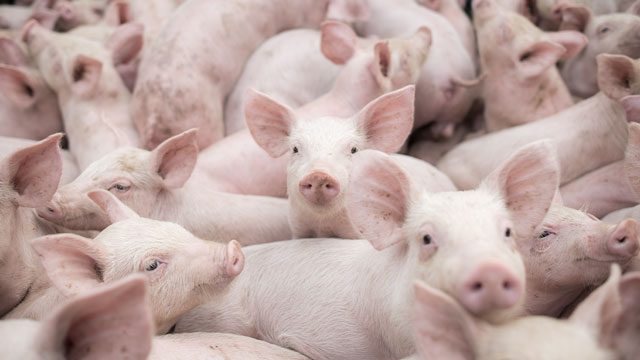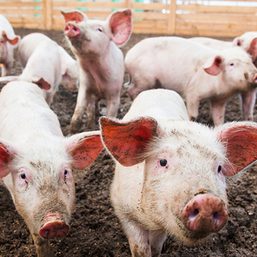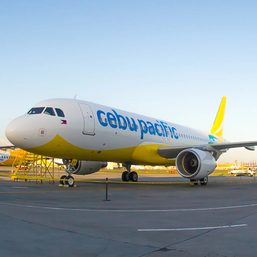SUMMARY
This is AI generated summarization, which may have errors. For context, always refer to the full article.

PALAWAN, Philippines – Hog industry players in Puerto Princesa City identified the high cost of livestock feeds, as well as competition between local buyers and those from outside Palawan, as the primary drivers behind the escalating pork prices in the city.
Local hog raisers said this on Thursday, February 29, in response to the sudden surge in pork prices in Puerto Princesa’s markets, which has been attributed to a supply shortage caused by traders from areas with high demand for pork supply due to measures implemented in response to the African Swine Fever (ASF) threat.
For many hog raisers in Puerto Princesa, the buyers based in areas such as Iloilo and Metro Manila provide additional income opportunities and new markets for their livestock.
Fe Alarde, a local hog grower in Inagawan village, said she has been selling 15 to 20 heads monthly to local buyers who are also supplying pork products to the local public market. The difference this time is that the local buyers need to compete with Iloilo-based hog buyers.
Alarde said, “Nakakabawi na kami sa aming pagkakalugi. Abunado po kami dati dahil binabarat kami ng mga buyers. Dahil sa taas ng presyo na kuha ng taga Iloilo kailangan nila (local hog buyers) itong tapatan kaya kailangang mag-jack nila dahil sa competition.”
(We are starting to recover from our losses. We used to suffer losses because buyers would haggle with us. Due to the high prices set by those from Iloilo, our local hog buyers need to match them, so they have to increase their prices because of the competition.)
Alarde also brushed aside assertions that there is a shortage of hog supply in Puerto Princesa, pointing out that many of those who had stopped before have resumed because of the attractive buying prices, which currently range from P180 to P190 per kilogram.
Manuel Torrefiel, who has been raising nearly 100 heads in a backyard piggery in Barangay Sicsican, said he and other local hog raisers prefer Iloilo-based buyers because of their higher buying price.
City Veterinary Officer Indira Santiago said more than 200 pigs were being processed daily at the slaughterhouse.
The abattoir, based on data from city hall, had 210 heads processed on Wednesday, February 28, and 270 more on Thursday, February 29.
“Sabi nila nauubos na daw yung baboy. Bastante naman tayo. Hindi naman kulang dahil sa average natin na 240 heads daily. Ngayon (February 29) nasa 270 tayo, ibig sabihin merong baboy,” Santiago said.
(They say that pigs are running out. We have plenty. It’s not scarce because of our average of 240 heads daily. Today [February 29], we’re at 270, which means there are pigs.)
City Legal Officer Norman Brian Yap said the prices of commodities are dictated by market forces, and the local government can intervene and go after unscrupulous traders if there is clear hoarding, cartel, price manipulation, and profiteering.
“It’s a free market economy. We are not in a command economy. Talagang it’s a fair competition market. Doon lang tayo papasok kung ang competition na yun ay mina-manipulate or may profiteering. (It really is a fair competition market. We only step in if that competition is being manipulated or if there’s profiteering involved.) Market forces will dictate the price,” Yap said.
Data from the Department of Agriculture (DA) suggest that local meat vendors in the city’s public market, many of whom sell about three to four heads daily, are earning some P38 per kilogram of pork, and local officials concluded that no profiteering was taking place.
Ariel Colongon, a DA senior science research specialist, cited several challenges in Puerto Princesa’s hog industry: the absence of multiplier farms for high-quality breeding stock, a shortage of locally sourced feed, limited understanding of proper pig husbandry techniques, and a lack of essential post-harvest facilities, and transportation services.
“It’s time to start exporting our products since we’re free from ASF. This way, we can eliminate or at least reduce the involvement of middlemen,” Colongon said.
Puerto Princesa Councilor Elgin Robert Damasco, the chairman of the city council’s committee on food, agriculture, and fisheries, proposed that the local government establish a feed mill as an economic enterprise to help the local hog industry. – Rappler.com
Gerardo C. Reyes Jr is a community journalist at Palawan Daily News and is an Aries Rufo journalism fellow of Rappler for 2023-2024.
Add a comment
How does this make you feel?







![[ANALYSIS] A post mortem on the rice price ceiling](https://www.rappler.com/tachyon/2023/10/tl-riceceiling.jpg?resize=257%2C257&crop=245px%2C0px%2C720px%2C720px)
![[EDITORIAL] Talagang ‘ibang usapin ang bigas’](https://www.rappler.com/tachyon/2023/10/animated-rice-inflation-bbm-carousel.jpg?resize=257%2C257&crop_strategy=attention)





There are no comments yet. Add your comment to start the conversation.